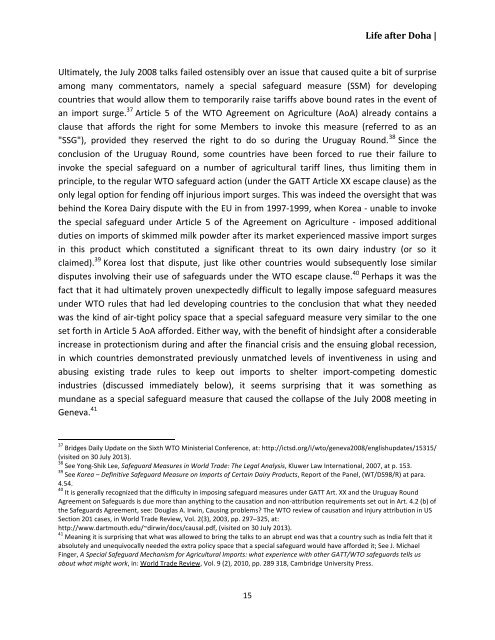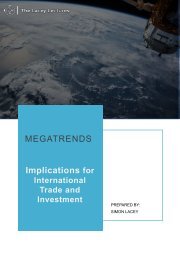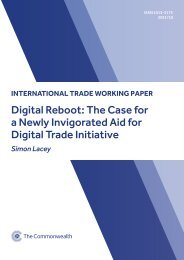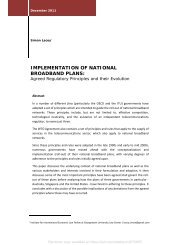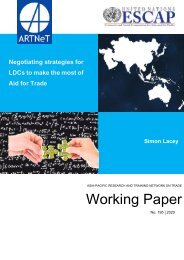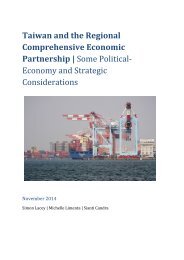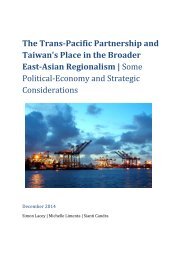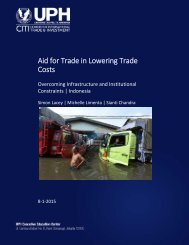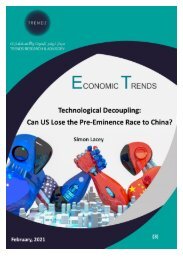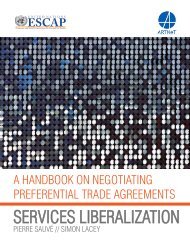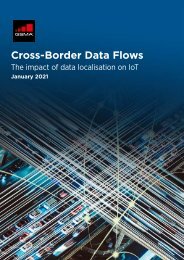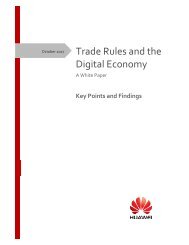Life after Doha: Some reflections in the run up to the 9th WTO Ministerial Conference on Bali
This is a book chapter that I wrote for an edited volume commissioned by the World Trade Institute in Berne, University Pelita Harapan and the Economic Research Institute for ASEAN and East Asia (ERIA), both in Jakarta. My chapter discusses how the multilateral trading system came to become intractibly bogged down in the Doha Round and argues that the WTO is still the best organization the world has for tacking a number of increasingly pressing issues. The book in its entirety can be viewed and downloaded at: https://www.eria.org/publications/the-road-to-bali-eria-perspectives-on-the-wto-ministerial-and-asian-integration/
This is a book chapter that I wrote for an edited volume commissioned by the World Trade Institute in Berne, University Pelita Harapan and the Economic Research Institute for ASEAN and East Asia (ERIA), both in Jakarta.
My chapter discusses how the multilateral trading system came to become intractibly bogged down in the Doha Round and argues that the WTO is still the best organization the world has for tacking a number of increasingly pressing issues.
The book in its entirety can be viewed and downloaded at: https://www.eria.org/publications/the-road-to-bali-eria-perspectives-on-the-wto-ministerial-and-asian-integration/
- No tags were found...
Create successful ePaper yourself
Turn your PDF publications into a flip-book with our unique Google optimized e-Paper software.
<str<strong>on</strong>g>Life</str<strong>on</strong>g> <str<strong>on</strong>g>after</str<strong>on</strong>g> <str<strong>on</strong>g>Doha</str<strong>on</strong>g> | <br />
Ultimately, <str<strong>on</strong>g>the</str<strong>on</strong>g> July 2008 talks failed ostensibly over an issue that caused quite a bit of surprise <br />
am<strong>on</strong>g many commenta<str<strong>on</strong>g>to</str<strong>on</strong>g>rs, namely a special safeguard measure (SSM) for develop<str<strong>on</strong>g>in</str<strong>on</strong>g>g <br />
countries that would allow <str<strong>on</strong>g>the</str<strong>on</strong>g>m <str<strong>on</strong>g>to</str<strong>on</strong>g> temporarily raise tariffs above bound rates <str<strong>on</strong>g>in</str<strong>on</strong>g> <str<strong>on</strong>g>the</str<strong>on</strong>g> event of <br />
an import surge. 37 Article 5 of <str<strong>on</strong>g>the</str<strong>on</strong>g> <str<strong>on</strong>g>WTO</str<strong>on</strong>g> Agreement <strong>on</strong> Agriculture (AoA) already c<strong>on</strong>ta<str<strong>on</strong>g>in</str<strong>on</strong>g>s a <br />
clause that affords <str<strong>on</strong>g>the</str<strong>on</strong>g> right for some Members <str<strong>on</strong>g>to</str<strong>on</strong>g> <str<strong>on</strong>g>in</str<strong>on</strong>g>voke this measure (referred <str<strong>on</strong>g>to</str<strong>on</strong>g> as an <br />
"SSG"), provided <str<strong>on</strong>g>the</str<strong>on</strong>g>y reserved <str<strong>on</strong>g>the</str<strong>on</strong>g> right <str<strong>on</strong>g>to</str<strong>on</strong>g> do so dur<str<strong>on</strong>g>in</str<strong>on</strong>g>g <str<strong>on</strong>g>the</str<strong>on</strong>g> Uruguay Round. 38 S<str<strong>on</strong>g>in</str<strong>on</strong>g>ce <str<strong>on</strong>g>the</str<strong>on</strong>g> <br />
c<strong>on</strong>clusi<strong>on</strong> of <str<strong>on</strong>g>the</str<strong>on</strong>g> Uruguay Round, some countries have been forced <str<strong>on</strong>g>to</str<strong>on</strong>g> rue <str<strong>on</strong>g>the</str<strong>on</strong>g>ir failure <str<strong>on</strong>g>to</str<strong>on</strong>g> <br />
<str<strong>on</strong>g>in</str<strong>on</strong>g>voke <str<strong>on</strong>g>the</str<strong>on</strong>g> special safeguard <strong>on</strong> a number of agricultural tariff l<str<strong>on</strong>g>in</str<strong>on</strong>g>es, thus limit<str<strong>on</strong>g>in</str<strong>on</strong>g>g <str<strong>on</strong>g>the</str<strong>on</strong>g>m <str<strong>on</strong>g>in</str<strong>on</strong>g> <br />
pr<str<strong>on</strong>g>in</str<strong>on</strong>g>ciple, <str<strong>on</strong>g>to</str<strong>on</strong>g> <str<strong>on</strong>g>the</str<strong>on</strong>g> regular <str<strong>on</strong>g>WTO</str<strong>on</strong>g> safeguard acti<strong>on</strong> (under <str<strong>on</strong>g>the</str<strong>on</strong>g> GATT Article XX escape clause) as <str<strong>on</strong>g>the</str<strong>on</strong>g> <br />
<strong>on</strong>ly legal opti<strong>on</strong> for fend<str<strong>on</strong>g>in</str<strong>on</strong>g>g off <str<strong>on</strong>g>in</str<strong>on</strong>g>jurious import surges. This was <str<strong>on</strong>g>in</str<strong>on</strong>g>deed <str<strong>on</strong>g>the</str<strong>on</strong>g> oversight that was <br />
beh<str<strong>on</strong>g>in</str<strong>on</strong>g>d <str<strong>on</strong>g>the</str<strong>on</strong>g> Korea Dairy dispute with <str<strong>on</strong>g>the</str<strong>on</strong>g> EU <str<strong>on</strong>g>in</str<strong>on</strong>g> from 1997-‐1999, when Korea -‐ unable <str<strong>on</strong>g>to</str<strong>on</strong>g> <str<strong>on</strong>g>in</str<strong>on</strong>g>voke <br />
<str<strong>on</strong>g>the</str<strong>on</strong>g> special safeguard under Article 5 of <str<strong>on</strong>g>the</str<strong>on</strong>g> Agreement <strong>on</strong> Agriculture -‐ imposed additi<strong>on</strong>al <br />
duties <strong>on</strong> imports of skimmed milk powder <str<strong>on</strong>g>after</str<strong>on</strong>g> its market experienced massive import surges <br />
<str<strong>on</strong>g>in</str<strong>on</strong>g> this product which c<strong>on</strong>stituted a significant threat <str<strong>on</strong>g>to</str<strong>on</strong>g> its own dairy <str<strong>on</strong>g>in</str<strong>on</strong>g>dustry (or so it <br />
claimed). 39 Korea lost that dispute, just like o<str<strong>on</strong>g>the</str<strong>on</strong>g>r countries would subsequently lose similar <br />
disputes <str<strong>on</strong>g>in</str<strong>on</strong>g>volv<str<strong>on</strong>g>in</str<strong>on</strong>g>g <str<strong>on</strong>g>the</str<strong>on</strong>g>ir use of safeguards under <str<strong>on</strong>g>the</str<strong>on</strong>g> <str<strong>on</strong>g>WTO</str<strong>on</strong>g> escape clause. 40 Perhaps it was <str<strong>on</strong>g>the</str<strong>on</strong>g> <br />
fact that it had ultimately proven unexpectedly difficult <str<strong>on</strong>g>to</str<strong>on</strong>g> legally impose safeguard measures <br />
under <str<strong>on</strong>g>WTO</str<strong>on</strong>g> rules that had led develop<str<strong>on</strong>g>in</str<strong>on</strong>g>g countries <str<strong>on</strong>g>to</str<strong>on</strong>g> <str<strong>on</strong>g>the</str<strong>on</strong>g> c<strong>on</strong>clusi<strong>on</strong> that what <str<strong>on</strong>g>the</str<strong>on</strong>g>y needed <br />
was <str<strong>on</strong>g>the</str<strong>on</strong>g> k<str<strong>on</strong>g>in</str<strong>on</strong>g>d of air-‐tight policy space that a special safeguard measure very similar <str<strong>on</strong>g>to</str<strong>on</strong>g> <str<strong>on</strong>g>the</str<strong>on</strong>g> <strong>on</strong>e <br />
set forth <str<strong>on</strong>g>in</str<strong>on</strong>g> Article 5 AoA afforded. Ei<str<strong>on</strong>g>the</str<strong>on</strong>g>r way, with <str<strong>on</strong>g>the</str<strong>on</strong>g> benefit of h<str<strong>on</strong>g>in</str<strong>on</strong>g>dsight <str<strong>on</strong>g>after</str<strong>on</strong>g> a c<strong>on</strong>siderable <br />
<str<strong>on</strong>g>in</str<strong>on</strong>g>crease <str<strong>on</strong>g>in</str<strong>on</strong>g> protecti<strong>on</strong>ism dur<str<strong>on</strong>g>in</str<strong>on</strong>g>g and <str<strong>on</strong>g>after</str<strong>on</strong>g> <str<strong>on</strong>g>the</str<strong>on</strong>g> f<str<strong>on</strong>g>in</str<strong>on</strong>g>ancial crisis and <str<strong>on</strong>g>the</str<strong>on</strong>g> ensu<str<strong>on</strong>g>in</str<strong>on</strong>g>g global recessi<strong>on</strong>, <br />
<str<strong>on</strong>g>in</str<strong>on</strong>g> which countries dem<strong>on</strong>strated previously unmatched levels of <str<strong>on</strong>g>in</str<strong>on</strong>g>ventiveness <str<strong>on</strong>g>in</str<strong>on</strong>g> us<str<strong>on</strong>g>in</str<strong>on</strong>g>g and <br />
abus<str<strong>on</strong>g>in</str<strong>on</strong>g>g exist<str<strong>on</strong>g>in</str<strong>on</strong>g>g trade rules <str<strong>on</strong>g>to</str<strong>on</strong>g> keep out imports <str<strong>on</strong>g>to</str<strong>on</strong>g> shelter import-‐compet<str<strong>on</strong>g>in</str<strong>on</strong>g>g domestic <br />
<str<strong>on</strong>g>in</str<strong>on</strong>g>dustries (discussed immediately below), it seems surpris<str<strong>on</strong>g>in</str<strong>on</strong>g>g that it was someth<str<strong>on</strong>g>in</str<strong>on</strong>g>g as <br />
mundane as a special safeguard measure that caused <str<strong>on</strong>g>the</str<strong>on</strong>g> collapse of <str<strong>on</strong>g>the</str<strong>on</strong>g> July 2008 meet<str<strong>on</strong>g>in</str<strong>on</strong>g>g <str<strong>on</strong>g>in</str<strong>on</strong>g> <br />
Geneva. 41<br />
37 Bridges Daily Update <strong>on</strong> <str<strong>on</strong>g>the</str<strong>on</strong>g> Sixth <str<strong>on</strong>g>WTO</str<strong>on</strong>g> M<str<strong>on</strong>g>in</str<strong>on</strong>g>isterial <str<strong>on</strong>g>C<strong>on</strong>ference</str<strong>on</strong>g>, at: http://ictsd.org/i/w<str<strong>on</strong>g>to</str<strong>on</strong>g>/geneva2008/english<str<strong>on</strong>g>up</str<strong>on</strong>g>dates/15315/ <br />
(visited <strong>on</strong> 30 July 2013). <br />
38 See Y<strong>on</strong>g-‐Shik Lee, Safeguard Measures <str<strong>on</strong>g>in</str<strong>on</strong>g> World Trade: The Legal Analysis, Kluwer Law Internati<strong>on</strong>al, 2007, at p. 153. <br />
39 See Korea – Def<str<strong>on</strong>g>in</str<strong>on</strong>g>itive Safeguard Measure <strong>on</strong> Imports of Certa<str<strong>on</strong>g>in</str<strong>on</strong>g> Dairy Products, Report of <str<strong>on</strong>g>the</str<strong>on</strong>g> Panel, (WT/DS98/R) at para. <br />
4.54. <br />
40 It is generally recognized that <str<strong>on</strong>g>the</str<strong>on</strong>g> difficulty <str<strong>on</strong>g>in</str<strong>on</strong>g> impos<str<strong>on</strong>g>in</str<strong>on</strong>g>g safeguard measures under GATT Art. XX and <str<strong>on</strong>g>the</str<strong>on</strong>g> Uruguay Round <br />
Agreement <strong>on</strong> Safeguards is due more than anyth<str<strong>on</strong>g>in</str<strong>on</strong>g>g <str<strong>on</strong>g>to</str<strong>on</strong>g> <str<strong>on</strong>g>the</str<strong>on</strong>g> causati<strong>on</strong> and n<strong>on</strong>-‐attributi<strong>on</strong> requirements set out <str<strong>on</strong>g>in</str<strong>on</strong>g> Art. 4.2 (b) of <br />
<str<strong>on</strong>g>the</str<strong>on</strong>g> Safeguards Agreement, see: Douglas A. Irw<str<strong>on</strong>g>in</str<strong>on</strong>g>, Caus<str<strong>on</strong>g>in</str<strong>on</strong>g>g problems? The <str<strong>on</strong>g>WTO</str<strong>on</strong>g> review of causati<strong>on</strong> and <str<strong>on</strong>g>in</str<strong>on</strong>g>jury attributi<strong>on</strong> <str<strong>on</strong>g>in</str<strong>on</strong>g> US <br />
Secti<strong>on</strong> 201 cases, <str<strong>on</strong>g>in</str<strong>on</strong>g> World Trade Review, Vol. 2(3), 2003, pp. 297–325, at: <br />
http://www.dartmouth.edu/~dirw<str<strong>on</strong>g>in</str<strong>on</strong>g>/docs/causal.pdf, (visited <strong>on</strong> 30 July 2013). <br />
41 Mean<str<strong>on</strong>g>in</str<strong>on</strong>g>g it is surpris<str<strong>on</strong>g>in</str<strong>on</strong>g>g that what was allowed <str<strong>on</strong>g>to</str<strong>on</strong>g> br<str<strong>on</strong>g>in</str<strong>on</strong>g>g <str<strong>on</strong>g>the</str<strong>on</strong>g> talks <str<strong>on</strong>g>to</str<strong>on</strong>g> an abr<str<strong>on</strong>g>up</str<strong>on</strong>g>t end was that a country such as India felt that it <br />
absolutely and unequivocally needed <str<strong>on</strong>g>the</str<strong>on</strong>g> extra policy space that a special safeguard would have afforded it; See J. Michael <br />
F<str<strong>on</strong>g>in</str<strong>on</strong>g>ger, A Special Safeguard Mechanism for Agricultural Imports: what experience with o<str<strong>on</strong>g>the</str<strong>on</strong>g>r GATT/<str<strong>on</strong>g>WTO</str<strong>on</strong>g> safeguards tells us <br />
about what might work, <str<strong>on</strong>g>in</str<strong>on</strong>g>: World Trade Review, Vol. 9 (2), 2010, pp. 289 318, Cambridge University Press. <br />
15


